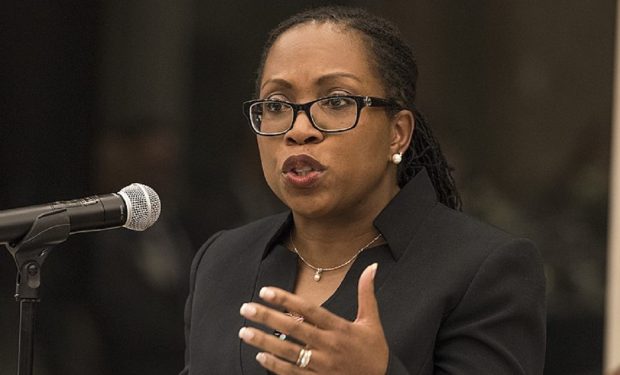Eminent lawyer and Harvard professor Laurence Tribe emphasized a particularly poignant piece of Justice Kentanji Brown Jackson‘s scathing dissent in the Supreme Court’s decision to scuttle affirmative action in two higher education cases.
[Chief Justice John Roberts, writing for the 6-3 majority, asserted that the affirmative action policies under consideration “unavoidably employ race in a negative manner.”]
Tribe quotes Justice Jackson’s pithy description of how racial diversity, in the Supreme Court’s view, is seen as desirable and applicable in practice when done in service of certain necessities of American society — supplying soldiers, for example — but not when it comes to the privileges of that society, such as providing higher education pathways that lead to opportunity and success in the corporate-driven system of American market capitalism.
“The court has come to rest on the bottom-line conclusion,” Jackson writes, citing what she characterizes as a perverse interpretation of the Equal Protection Clause, “that racial diversity in higher education is only worth preserving insofar as it might be needed to prepare Black Americans and other underrepresented minorities for success in the bunker, not the boardroom.”
Justice Jackson rages against the use of the Equal Protection Clause to “obstruct our collective progress” and calls it “truly a tragedy for us all.”
Justice Jackson wrote, “The court has come to rest on the conclusion that racial diversity in higher education is only worth preserving insofar as it might be needed to prepare Black Americans and other underrepresented minorities for success in the bunker, not the boardroom.”
— Laurence Tribe
(@tribelaw) June 29, 2023
Yet in another tweet on the decision, disagreeing with Jackson’s interpretation of what the decision ultimately means in practice, Tribe digs into a significant statement in Roberts’s opinion.
Jackson writes: “Simply put, the race-blind admissions stance the Court mandates from this day forward is unmoored from critical real-life circumstances.”
Tribe doesn’t necessarily disagree with Jackson’s point about real-life circumstances, but he doesn’t see the decision as mandating “race-blind admissions,” as Jackson asserts.
Tribe specifically identifies a loophole in that “mandate” that presumably allows race to remain a factor in admissions, but only if described in prose and not merely checked off in a box on a form.
Indeed, Tribe interprets the Court’s allowance of racial discussion in the admissions process as countering the idea of “race-blind admissions” — since race is specifically permitted.
“Nothing in this opinion should be construed as prohibiting universities from considering an applicant’s discussion of how race affected his or her life,” Roberts writes, “be it through discrimination, inspiration, or otherwise.”
From this Tribe concludes: “So race-blind admissions are NOT required.”
“Nothing in this opinion should be construed as prohibiting universities from considering an applicant's discussion of how race affected his or her life, be it through discrimination, inspiration, or otherwise.” So race-blind admissions are NOT required. https://t.co/OSCwncbkJK
— Laurence Tribe
(@tribelaw) June 29, 2023
